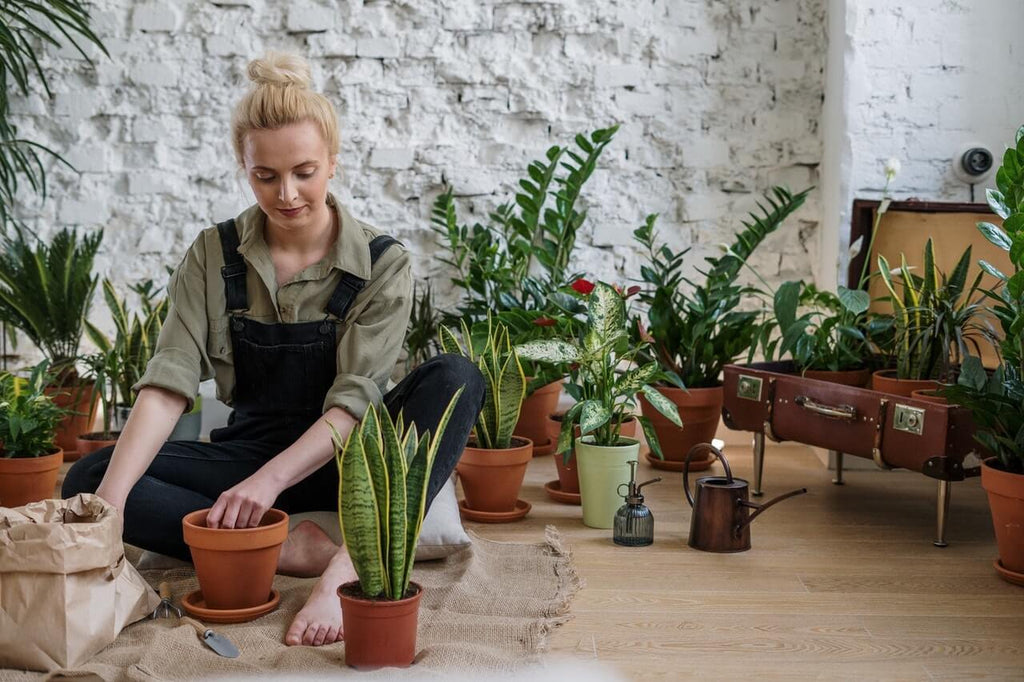HousePlantJoy is supported by our audience. When you purchase through one of our links, we may earn a small affiliate commission. As an Amazon Associate I earn from qualifying purchases. Your cost is not affected.
==================
Did you know that adding a little greenery to your living space can do wonders for your health and well-being? Can houseplants help reduce stress? Absolutely! Houseplants offer numerous health benefits, from reducing stress to purifying our air.
With their vibrant colors and textures, houseplants tap into this biophilic connection. They provide a sense of serenity and tranquility, effectively reducing stress and promoting relaxation. Tending to these plants can also be a form of “horticultural therapy,” a practice that reduces cortisol levels and enhances well-being.
In this blog post, we’ll delve into the fascinating world of indoor plants and explore their various health benefits. Join us on this journey as we uncover the wonders of houseplants and how they can positively impact our lives.
Explore How Indoor Greenery Can Bring Peace and Calm to Your Life
Feeling stressed? You’re not alone. With our fast-paced lives, stress has become a common issue for many people. Imagine that you could feel more relaxed and at ease by incorporating indoor plants into your living space. Indoor plants can significantly reduce psychological and physiological stress levels, promoting relaxation and well-being.
Besides infusing our homes with a touch of nature, indoor plants double as natural air purifiers, reducing indoor air pollution. They’ve even been found to improve the attention span and test scores of college students who performed cognitive tasks in offices with greenery.
Whether it’s a snake plant in your bedroom or a collection of succulents in your living room, embracing the natural world through houseplants can positively impact your stress levels and overall well-being.
The Science Behind Houseplants and Stress Relief
The stress-reducing power of houseplants isn’t merely a popular belief; it’s rooted in firm scientific research. Studies have found that working with houseplants can significantly reduce common indicators of stress, such as cortisol levels, blood pressure, and heart rates. Furthermore, houseplants have been shown to help improve test scores and attention spans, making them a great addition to workspaces and study areas.
Plants’ stress-relieving properties can be attributed to their ability to reduce psychological and physiological stress. They release water vapor, which helps maintain indoor humidity levels, creating a more comfortable environment for us to live and work in. So, not only do houseplants add a touch of beauty to our homes, but they also play a vital role in improving our mental health and well-being.
Best Indoor Plants for Stress Reduction
With the stress-relieving power of houseplants scientifically proven, it’s time to delve into the best indoor plants that aid in stress reduction.
- Peace lilies, for example, have a calming effect and can help promote relaxation. They also help reduce mold spores in the air, creating a healthier environment which can further reduce stress.
- English ivy is also a great option for stress reduction. English ivy helps purify the air, improving respiratory health and creating a calming atmosphere in small spaces.
- Chinese evergreens, also known as Aglaonema, can boost mood and efficiency, reduce stress levels, and provide a sense of calm and relaxation.
Incorporating these indoor plants, also known as interior landscape plants, into your living space can help create a more peaceful and stress-free environment.
Improving Indoor Air Quality with Houseplants
Beyond their stress-reducing benefits, houseplants are essential in enhancing indoor air quality. Many indoor settings suffer from poor air quality due to toxins and pollutants, which can negatively impact our health. Houseplants can help improve indoor air quality by:
- Removing harmful substances from the air
- Absorbing carbon dioxide and releasing oxygen through photosynthesis
- Increasing humidity levels
- Reducing airborne dust and allergens
By incorporating an indoor plant and other houseplants into your indoor space, you can enjoy the benefits of indoor plants, creating a healthier and more pleasant environment.
Houseplants can effectively filter out pollutants and improve air quality by absorbing toxins through their leaves and roots. Additionally, plants absorb carbon dioxide, making our living spaces more comfortable and contributing to better respiratory health.
So, whether you have a small apartment or a spacious house, adding houseplants to your living space can significantly improve the air quality and enhance your well-being.
Houseplants as Natural Air Purifiers
Serving as natural air purifiers, houseplants help create healthier and more pleasant indoor environments. They can help reduce volatile organic compounds (VOCs) in the air and harmful chemicals emitted by everyday household items, such as cleaning products, paints, and furniture. A study by NASA even found that houseplants can reduce chemicals in indoor air, suggesting that having 15-18 plants can significantly lower VOC levels in an 1800-square-foot home.
Some indoor plants are particularly effective at purifying the air and reducing VOCs. For example, bromeliads can remove up to 80% of six common VOCs from the air in just 12 hours, and dracaena can eliminate 94% of acetone at the same time.
Incorporating these air-purifying plants into your home allows you to breathe easier and enjoy a healthier living environment.
Top Air-Purifying Indoor Plants
So, which indoor plants should you choose to purify your indoor air? Some of the top air-purifying indoor plants include spider plants, snake plants, and pothos.
- Spider plants are known for removing pollutants and allergens from indoor air, making them an excellent choice for allergy sufferers.
- Snake plants effectively take in toxins through their leaves and release pure oxygen.
- Pothos plants are also among the top houseplants for eliminating indoor air pollutants. To reap the benefits of pothos, it’s suggested to have two or three plants in 8 to 10-inch pots per 100 square feet of space.
Incorporating these air-purifying indoor plants into your home can create a healthier and more comfortable living environment, ensuring clean indoor air and effective indoor air pollution abatement for yourself and your loved ones.
Boosting Mental Health and Well-being with Indoor Plants
Houseplants offer more than just stress reduction and air purification; they can also positively influence our mental health and well-being. Having indoor plants in our living spaces can create a calming and nurturing atmosphere that fosters emotional and psychological well-being. By bringing a little piece of nature into our homes, we can benefit from the positive effects of green spaces on our mood, focus, and overall mental health.
Several studies have found that individuals living in urban areas with access to green spaces experience less mental distress, anxiety, and depression. Incorporating houseplants into our daily lives can improve our mental well-being and create a more joyful and harmonious living environment.
How Green Spaces Improve Mental Health
The benefits of green spaces on mental health are well-documented in scientific research. Green spaces can lower stress levels, reduce rates of depression and anxiety, and promote a sense of well-being and happiness. Even the perception of being in a green environment can alleviate stress and depression, while socializing in green spaces can reduce loneliness, anxiety, and depression.
By incorporating houseplants into our indoor environments, we can bring the benefits of green spaces into our homes and improve our mental health. Houseplants can help create a healing and nurturing atmosphere that promotes emotional and psychological well-being, whether a small potted plant on your desk or a lush indoor garden.
Incorporating Houseplants into Daily Life
To fully utilize the mental health benefits of houseplants, it’s necessary to weave them into your daily routine. Place plants in areas where you spend a lot of time, such as your workspace or living room, to create a calming and soothing atmosphere. Taking a few minutes daily to water and care for your plants can provide a sense of mindfulness and relaxation.
Incorporating houseplants into your self-care routine can also be incredibly beneficial. Engage in therapeutic gardening or observe and appreciate your plants’ beauty. Making houseplants a part of your daily life allows you to enjoy a more peaceful and stress-free environment.
The Therapeutic Effects of Caring for Houseplants
The act of caring for houseplants can provide a therapeutic and gratifying experience. Tending to their needs and watching them grow can bring a sense of accomplishment, companionship, and purpose. Nurturing your plants can help take your mind off worries and provide a positive focus for your mental well-being.
Scientific studies have shown that caring for houseplants can positively affect our physiological, cognitive, and health-related well-being. Whether you’re a seasoned plant parent or a beginner, the therapeutic effects of caring for houseplants are undeniable.
So why not bring a little greenery into your life, let your plants thrive, and experience the joy of plant care?
Horticultural Therapy
Horticultural therapy uses plants and gardening to promote physical, mental, and emotional well-being. It has been gaining popularity as a complementary therapy for people with mental illnesses, offering a natural and holistic approach to healing. The American Horticultural Therapy Association defines horticultural therapy as a “professional practice that uses plants and gardening to improve mental and physical health.”
Medical clinics in Manchester, England, are exploring the potential of horticultural therapy to improve mental health and are prescribing potted plants to patients with symptoms of depression or anxiety. Such interventions can help alleviate these challenging emotions. Individuals can find solace, comfort, and healing in the natural world by engaging with plants and gardening activities.
The Rewards of Plant Care
The rewards of plant care go beyond the physical and mental health benefits discussed earlier. Caring for houseplants can give you a sense of pride and achievement as you watch them thrive and grow due to your care. This sense of accomplishment can boost your self-esteem and make you feel more capable and confident in other areas of your life.
Moreover, people often develop strong emotional attachments to their houseplants, as they provide a sense of satisfaction and joy. By nurturing your plants and creating a calming environment in your home, you can foster a deeper connection with nature and improve your overall well-being.
Houseplants and Physical Health
Houseplants provide many physical health benefits, extending far beyond stress reduction. For instance, indoor plants have been found to help reduce dependence on pain medication, decrease dust and mold in indoor air, and even help individuals recover from illness or injury more quickly. You can create a healthier and more comfortable living environment by incorporating houseplants into your home.
In addition to their mental health benefits, houseplants can also help improve respiratory health by reducing allergens in the air. By acting as natural humidifiers and air purifiers, houseplants can lessen respiratory irritation and create a more favorable environment for healing. So, whether you’re recovering from an illness or simply looking to improve your overall health, houseplants can provide numerous physical health benefits.
Healing Properties of Indoor Plants
Indoor plants are not only beautiful to look at but also possess healing properties that can improve our overall health. For example, they can help:
- Speed up recovery from illness
- Reduce dependence on painkillers
- Create a more comfortable and soothing environment
- Promote healing and improve our physical health
Some indoor plants, such as aloe vera, have direct healing properties that can be applied topically to soothing sunburns and other skin irritations. Incorporating these healing plants into your living space can harness their beneficial properties and create a healthier, more nurturing environment for yourself and your loved ones.
Houseplants for Allergen Reduction
Houseplants can also help reduce allergens in the home, improving respiratory health for those who suffer from allergies. It can reduce common allergens like dust and pet dander by removing toxins and pollutants from the air.
In addition, houseplants act as natural humidifiers, as plants release water vapor, helping to reduce respiratory irritation and create a more comfortable environment for allergy sufferers.
Some houseplants that are particularly effective at reducing allergens in the air include:
- Bamboo palm
- Heartleaf philodendron
- Spider plants
- Areca palm
- Peace lily
Incorporating these allergy-friendly plants into your home allows you to breathe easier and enjoy a healthier living environment.
Tips for Choosing and Maintaining Healthy Houseplants
To avail of the full range of benefits offered by houseplants, they must be selected and maintained appropriately. In this section, we’ll share tips on selecting and caring for indoor plants to ensure they thrive and provide numerous health benefits.
When selecting houseplants, consider their toxicity, especially if you have children or pets at home. Research the specific species to ensure it’s non-toxic and safe for your household.
Once you’ve chosen the right plants for your home, it’s essential to understand their basic needs, such as proper lighting, watering, and temperature. Regularly inspect your plants for pests and other issues, and keep them clean and well-maintained to maximize their health benefits.
Selecting Safe and Non-Toxic Houseplants
When choosing houseplants, it’s essential to consider their safety, especially if you have children or pets. Some plants can be toxic if ingested, posing a risk to your family and furry friends. To ensure the plants you bring into your home are safe, research their toxicity and consult reliable sources like the ASPCA for guidance.
Some safe and non-toxic houseplants to consider include:
- Christmas cactus
- Boston fern
- African violet
- Spider plant
- Cast iron plant
By selecting safe and non-toxic plants for your home, you can enjoy their numerous benefits without worrying about potential risks to your loved ones.
Basic Houseplant Care and Maintenance
After choosing the right houseplants for your home, catering to their needs with proper care and maintenance is essential, ensuring their growth and vitality. Understand the basic needs of your plants, such as proper lighting, watering, and temperature. Regularly inspect your plants for pests, and keep them clean and well-maintained to maximize their health benefits.
Avoid overwatering your plants, creating a breeding ground for mold and fungus gnats. Use the suitable soil and pot for your plants, and repot them when needed to ensure they continue growing and flourishing.
You’ll thoroughly enjoy their numerous health benefits by caring for your houseplants.
In today’s video, we’ll discuss how houseplants support our mental health, sharing how we integrate nature into our daily lives to stay active and find a healthy outlet for frustrations. While plants offer proven stress relief and anxiety reduction, we urge anyone struggling to seek help. You’re not alone!
Video Credit: @ThatFoliageLife
Greening Your Way to Serenity!
Houseplants offer many health benefits, from reducing stress and purifying the air to improving mental health and well-being. Incorporating houseplants into your daily life and providing proper care can create a healthier, more nurturing environment for yourself and your loved ones. So, go ahead and add a touch of green to your living space – your body and mind will thank you!
? Unleash Your Green Thumb! ?
Ready to dive into the wonderful world of houseplants? Follow us on our social media platforms to embark on an exciting journey of plant parenthood! ?
? Explore our website for expert tips and guides. FOLLOW US
? Facebook: HousePlantJoyBlog
? Instagram: @houseplantjoy20
? Pinterest: HousePlantJoy
? Twitter: @houseplantjoy
? TikTok: @houseplantjoy
Please stay connected with our vibrant community, where you’ll find daily inspiration, care tips, and the latest trends in indoor gardening. Don’t miss the plant-filled fun – hit that follow button now! ?✨
Frequently Asked Questions
Are houseplants good for stress?
Houseplants have been proven beneficial for reducing stress levels and symptoms of depression and anxiety. Horticultural therapy has increased well-being, and actively interacting with plants can reduce physical and psychological stress. Plants can also help promote healthier air quality, which further helps alleviate stress and anxiety.
Why do houseplants reduce stress?
Houseplants can help reduce stress and anxiety by promoting healthier air quality and removing environmental toxins. Indoor air pollution can hurt mental health, making having plants in your home or office essential for reducing stress levels.
Which plant is best for stress relief?
Chamomile is the best plant for stress relief, as it has long been known to have anti-anxiety effects and can aid with sleep.
How do houseplants act as natural air purifiers?
Houseplants naturally act as air purifiers, absorbing pollutants through their leaves and roots to reduce the levels of VOCs in the air.
What are some safe and non-toxic houseplants for homes with children or pets?
For households with children or pets, Christmas cacti, Boston fern, African violet, spider, and cast iron plants are all safe and non-toxic houseplants.

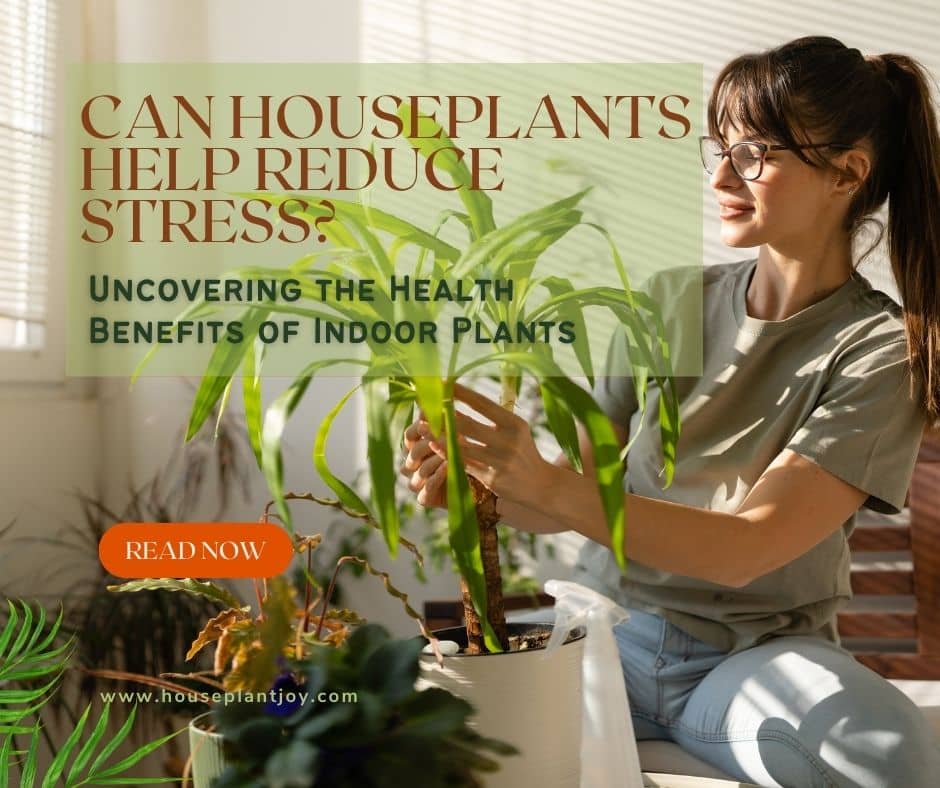

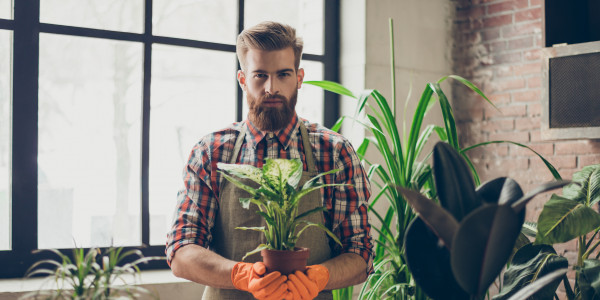
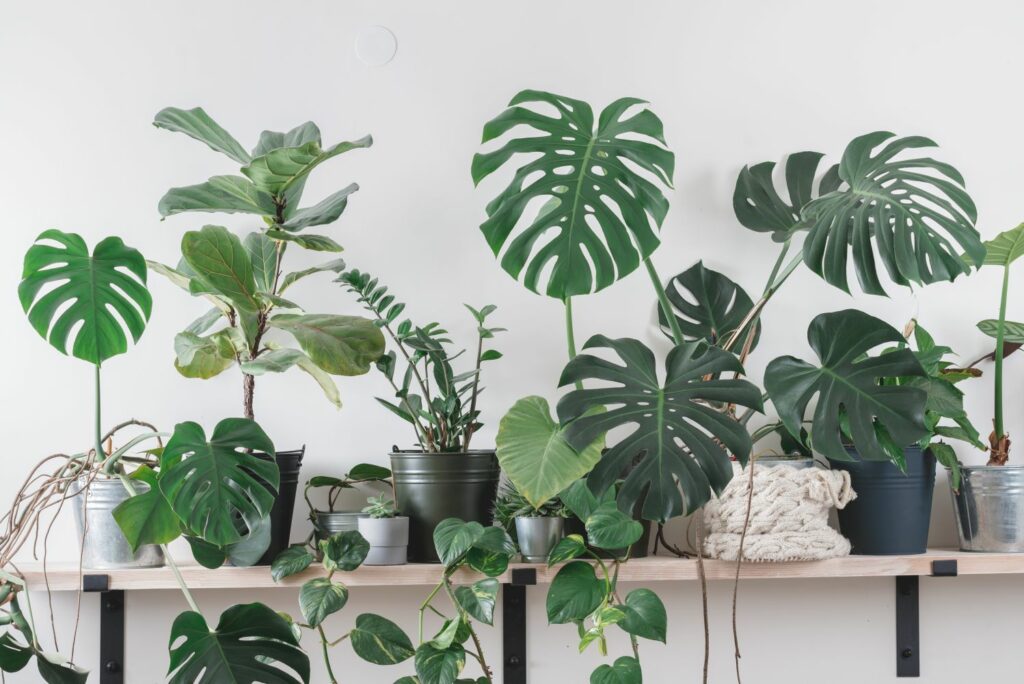

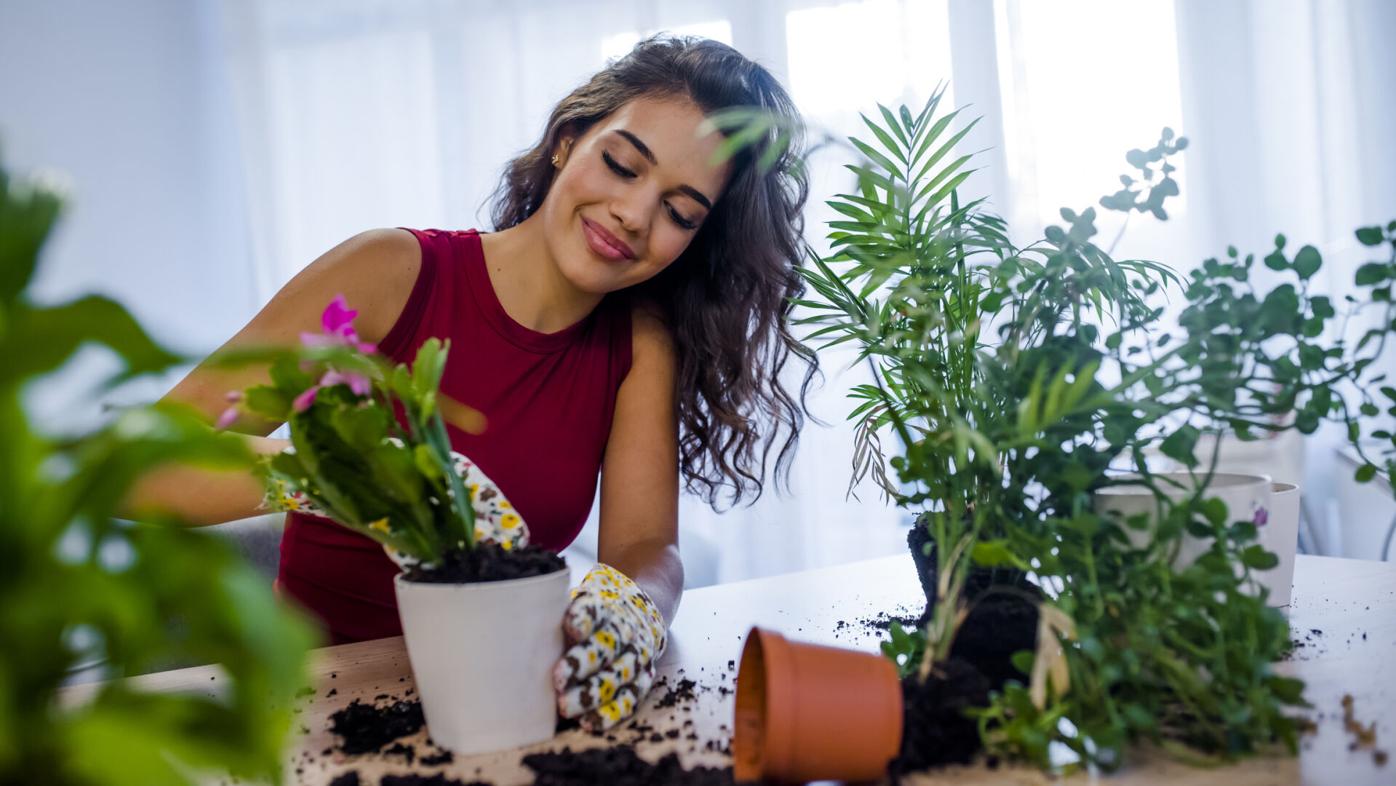
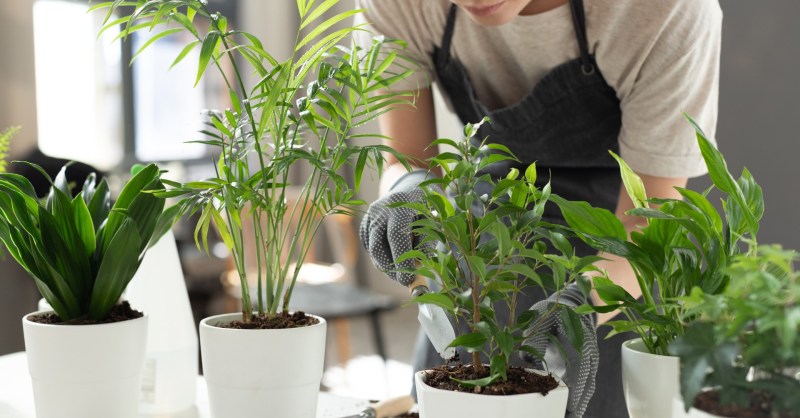
:max_bytes(150000):strip_icc()/large-indoor-plants-5094187_01-4a2113bf969d479a83ed339b6466b4c1.jpg)

